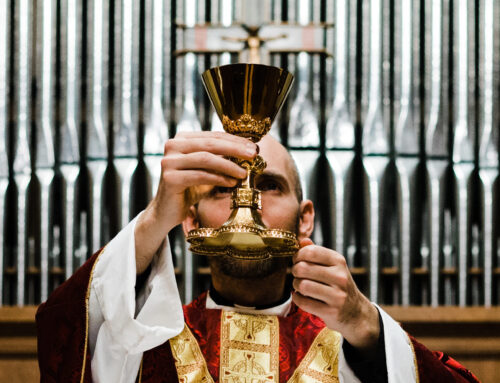Homily for the Feast of St. Philip Neri
St. Philip Neri, whose feast day we celebrate today, once said:
Let no one wear a mask, otherwise he will do ill. And if he has one, let him burn it.
This quote struck me as ironic, given that we are now required to wear face-masks at church in order to try preventing the spread of Coronavirus.
Obviously Philip didn’t have pandemics in mind when he said: “If you’re wearing a mask — burn it!”
So what’s St. Philip Neri, the Second Apostle of Rome, actually getting at?
Simply put: We can’t wear masks with God.
In our first reading this morning, we get a glimpse of what an unmasked, fully-alive Christian looks like: Saint Paul knew, perhaps better than anybody else, that he was totally exposed to the Lord — that he could wear no mask before the Ever-present, All-knowing God.
In our reading from Acts today, Saint Paul says to the Ephesians: “You know how I lived among you the whole time from the day I first came…I served the Lord with all humility and with the tears and trials that came to me…I solemnly declare to you this day that I am not responsible for the blood of any of you, for I did not shrink from proclaiming to you the entire plan of God!”
St. Paul was fully himself. He wore no mask. He presented the entirety of the good news of Jesus, sincerely and without any pretense. “By the grace of God” he writes to the Corinthians, “I am what I am, and His grace to me has not been in vain.”
There’s nothing about us that isn’t already completely known and seen by the Lord. Even when we don’t understand ourselves, God understands us perfectly. There’s no corner of our lives that we can prevent Him from being present to. Everything lies open to Him. We are — in a deep and unavoidable sense — totally exposed to His gaze.
This might make us nervous — there are very likely aspects of our lives that we’d rather the Lord NOT see. Behaviors, attitudes, thoughts that convict or embarrass us.
“No, you can’t love the real me,” we might say. “Here: Love this mask instead, God. It’s much easier to love!”
But we must remember: There is no aspect of our lives where God is not already LOVING us.
Are we willing to let Him love us? Jesus was sent to save unmasked sinners — He came to a dark and dead world, not merely to hand out masks and pretend we’re all ok, but to crucify our sins on a Cross: He came to prove that God is not against us, but is actually eternally FOR us.
Why bother hiding behind a mask anymore?
There’s no room for masks in Heaven.
Besides, God doesn’t wear masks with us!
He has revealed Himself to us — most definitively in His Son, Jesus!
We just heard in our Gospel today: “This is eternal life, that they should know you, the only true God, and the one whom you sent, Jesus Christ.”
Eternal life is to know the one, true, unmasked God. If we want to live forever with this God who is Himself present and available, willing to show us his wounds, radically exposed to us in the Blessed Sacrament — then we ought to take Philip Neri’s bold advice in return:
“If you’re wearing a mask — burn it!”





Excellent homily!! I love this. Thank you, Father Ferguson!
I looked for the history and context of this saying, and found it in the English translation of Pietro Giacomo Bacci’s Life of Saint Philip Neri, Apostle of Rome, published by Richardson & Sons in 1847 (volume 1, pages 201-202): “In the time of the Carnival he used to send his young penitents to act plays, in order to prevent their going to the Corso or to the exhibition of immodest comedies. It was for the same purpose that he introduced the pilgrimage to the Seven Churches, and the spiritual conferences in open places, as at Montecavallo, or Sant’ Onofrio, or in any other place which he considered convenient; and when he once heard that one of the youths had worn a mask, he rebuked him sharply, telling him he had done wrong, and that he was to be careful not to go to the masquerade any more, but to burn the mask.” So the admonition really had to do simply with avoiding occasions of sin.